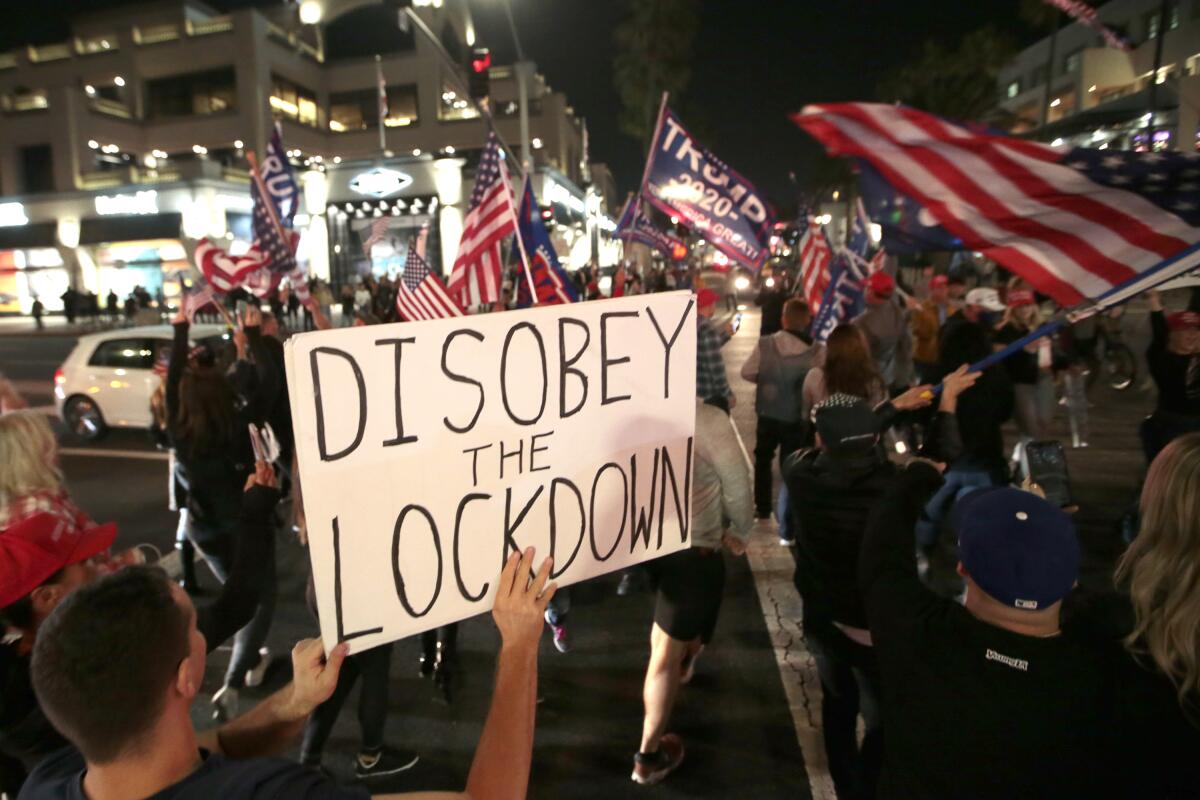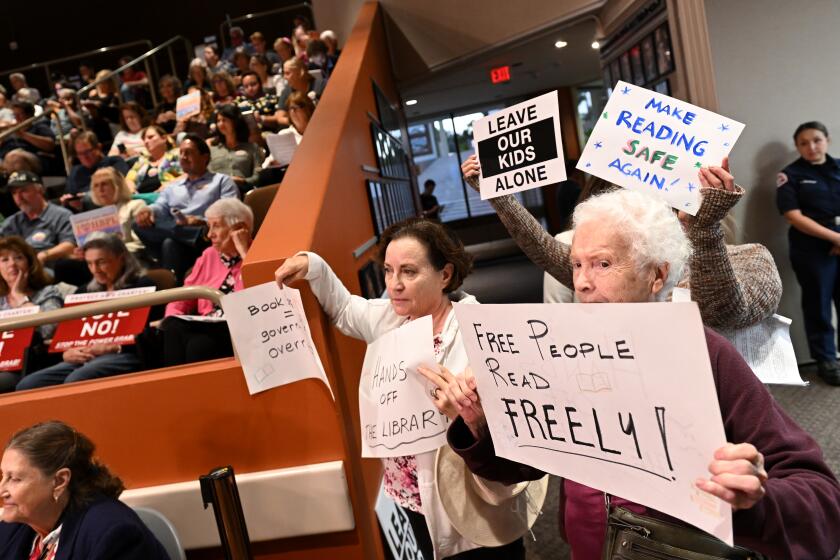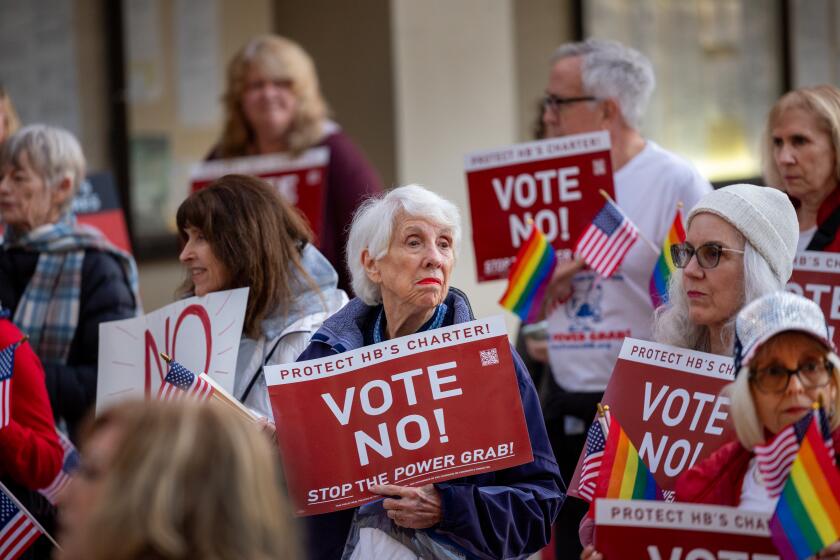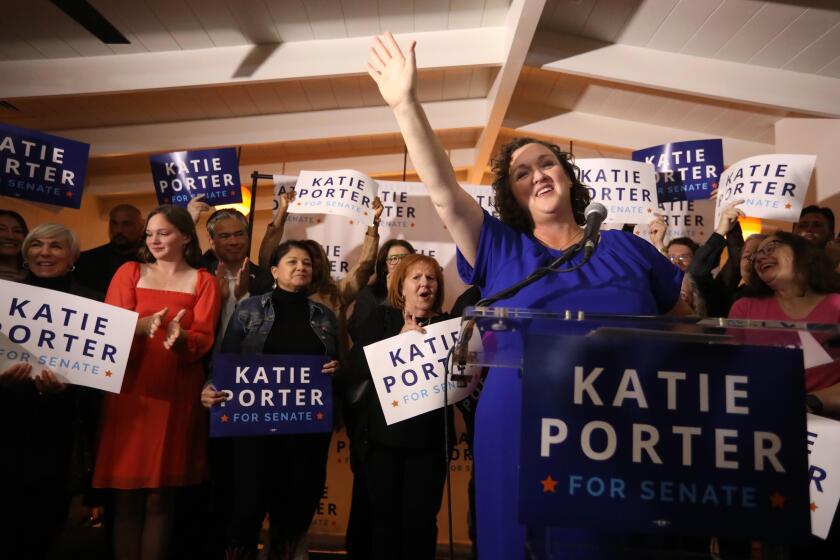Editorial: Huntington Beach’s MAGA message to the world

Two ballot measures passed last week by Huntington Beach voters — restricting which flags the city can fly and potentially requiring photo ID to vote — are abhorrent, but not for what they will accomplish. One of them has very little effect and is written in a way that’s neutral. The other is unlikely to survive a challenge by the state.
It’s the message of hatred and intolerance sent out by their passage that should worry residents of Huntington Beach, whose city has gained a reputation for ugly MAGA-style conservatism.
Giving residents censorship rights over librarians and the public crosses a clear line that should never be breached.
The city already had stopped flying the rainbow flag during LGBTQ Pride Month, but Measure B now prohibits the municipal government from flying it and others not on a very short list unless there is unanimous City Council agreement. Flags are limited to government and military organizations plus one for prisoners of war. The Olympic flag also is allowed for limited periods.
In a way, the measure is fair. It may not permit flags to honor the LGBTQ community, but neither will it allow the flags of racists or homophobes. Still, the intent of the new law is clear: to tell gay and transgender people they’re not welcome.
A posse of older residents is trying to rescue Huntington Beach from a hard-right wave. Donald Trump, they say, unleashed ‘a whole new way of politics.’
Of course, no measure can stop supporters of gay rights from carrying flags on city property or holding them up in meetings. Residents could reclaim the laissez-faire reputation of the city by showing up at City Hall with rainbow flags and turning council meetings into a dazzling array of colors.
Both measures were placed on the ballot by the City Council’s conservative majority, but Measure A has the potential to harm voter rights as well as the city budget by allowing the council to impose a voter ID rule for municipal elections. (The measure itself doesn’t impose voter ID.) Requiring photo identification, as Measure A would, is a known tactic to disenfranchise low-income citizens as well as the unhoused and the elderly, who are more likely to have lost or let their driver’s licenses expire.
When voter ID supporters talk about a free country, they should remember that includes people’s right to conduct their lives without having to show proof of citizenship to the government. Photos are required for a driver’s license because driving is a privilege. Voting is a right.
What the former president reveals on the stump should wipe away any doubt about which candidate is unhinged.
If implemented, Measure A also would cost money in a city that faces a deficit in the coming fiscal year. Municipal elections would have to be held separately from state and county elections, which is estimated to cost the city up to $1.6 million per election, not counting security and ballot tracking.
Beyond that are the costs the city would incur if it’s challenged in court. The state requires voter ID only in certain limited circumstances, and California Atty. Gen. Rob Bonta and Secretary of State Shirley Weber have said it would violate the law if Huntington Beach required ID to vote in city elections. State Sen. Dave Min (D-Irvine), a candidate for Congress in a district that includes Huntington Beach, has introduced legislation that would specifically outlaw the practice in municipal elections.
What is Huntington Beach gaining for this price? Not a thing. The city hasn’t documented a single case of voter fraud.
Sometimes, the big fish should stay in the small pond to defend the minnows from the sharks. And out of all the years Porter should’ve remained in place, it was 2024.
Huntington Beach has a long history as a conservative town. But it had elected a more liberal council majority — which ended in 2022 with a sweep by conservative candidates. That was no doubt caused in part by the pandemic, when Huntington Beach became ground zero in Southern California for the right-wing protest movement against COVID-19 restrictions, including rallies on the city’s landmark pier in defiance of a state curfew. Donald Trump’s loss of the 2020 presidential election also ignited a less Reagan-esque and more MAGA-fueled move to the right, which manifested in intentionally provocative policies such as a meaningless resolution in the fall of last year banning mask and vaccine mandates.
Even so, when the council placed inane restrictions on the purchases of new books in October — disrespecting the city’s professional librarians and placing the decisions with a panel of people who might have zero expertise and probably won’t even fully read the books — enough Huntington Beach residents were angered to make it seem that the populace might be dismayed by the direction taken by the new council.
It’s hard to tell whether they were. Less than 40% of the city’s registered voters cast ballots in this election, according to recent figures. Maybe the no-shows would have voted the same way — or maybe they didn’t realize that they were missing a chance to restore their city’s reputation. Or that their council is more involved in taking extremist positions than in prudently running an effective municipal government.
More to Read
A cure for the common opinion
Get thought-provoking perspectives with our weekly newsletter.
You may occasionally receive promotional content from the Los Angeles Times.














